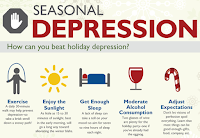I've been thinking a lot more about this phenomenon. I have been diagnosed with Complex Posttraumatic Stress Disorder (C-PTSD), so seeing how the article intersected with my life has been interesting to me. (A good explanation of C-PTSD can be found HERE)
As with PTSD, persons with C-PTSD often are seen for depression and anxiety, and it may take a while before a diagnosis of either form of PTSD is made. Meanwhile, the recurrent nature of depression and anxiety that happen in a person with PTSD is frustrating for both the clinician and for the client.
It is important to note that the holidays are difficult for anyone currently dealing with depression. Weather can play a big factor in the significance of the depression, given the mediating effect exercise and sunshine have for those who deal with depression. Additionally, if a person has experienced trauma around the holidays, the chances of having another wave of depression hit are very high.
Another difficulty with the holiday season is the idea that these are usually "family holidays", and the expectation is that we spend time with family. This can be difficult for someone with PTSD that has it's source within their family, which in turn creates grief over the loss of family, a deep longing (still!) to be with family, and potentially anger that the family member/members themselves caused this separation from the family, thus creating more isolation for someone who is already depressed.
Some of the other extenuating circumstances outlined in the above article affect persons with PTSD/C-PTSD in unexpected ways. The onset of winter and the time change can negatively impact the amount and quality of sleep, which can have a spiraling effect on mental health, especially on depression and anxiety. In addition, expected gaiety at holiday parties, higher-than-normal levels of drinking, and social interactions can all have negative impact on the person dealing with the depression/anxiety/PTSD/C-PTSD cocktail.
 |
| From Johns Hopkins Medicine |

No comments:
Post a Comment